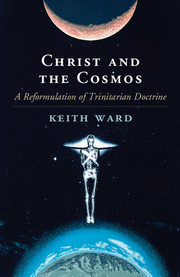Book contents
- Frontmatter
- Contents
- Preface
- Acknowledgements
- PART I THE THREEFOLD NATURE OF THE DIVINE BEING
- 1 Introduction: Talking about the Trinity
- 2 Why We May Need to Restate the Ways in Which We Talk about the Trinity
- 3 The Doctrine of Divine Simplicity
- 4 Cosmological and Axiological Explanation
- 5 Divine Potentiality and Temporality
- PART II THE BIBLICAL SOURCES OF TRINITARIAN THOUGHT
- PART III THE TRINITY, IMMANENT AND ECONOMIC
- PART IV THE SOCIAL TRINITY
- PART V THE COSMIC TRINITY
- Bibliography
- Subject Index
- Name Index
1 - Introduction: Talking about the Trinity
from PART I - THE THREEFOLD NATURE OF THE DIVINE BEING
Published online by Cambridge University Press: 05 September 2015
- Frontmatter
- Contents
- Preface
- Acknowledgements
- PART I THE THREEFOLD NATURE OF THE DIVINE BEING
- 1 Introduction: Talking about the Trinity
- 2 Why We May Need to Restate the Ways in Which We Talk about the Trinity
- 3 The Doctrine of Divine Simplicity
- 4 Cosmological and Axiological Explanation
- 5 Divine Potentiality and Temporality
- PART II THE BIBLICAL SOURCES OF TRINITARIAN THOUGHT
- PART III THE TRINITY, IMMANENT AND ECONOMIC
- PART IV THE SOCIAL TRINITY
- PART V THE COSMIC TRINITY
- Bibliography
- Subject Index
- Name Index
Summary
‘In the name of the Father, the Son, and the Holy Spirit …’ These are familiar words to millions of people throughout the world who accept the Christian faith. Yet they can be troublesome. To many Jews and Muslims, it sounds as if Christians believe in three gods. The Qur'an says, ‘They blaspheme who say “God is one of three in a Trinity”’ (Qur'an 5, 76). And many Christians would be at a loss if they had to say exactly what the Trinity is, and how God could be, in the words of the technical definition, ‘three persons in one substance’. I have even met Christian clergy who dread having to preach about the Trinity on Trinity Sunday, or who make do with some vastly oversimplified version which has little connection with any established theological traditions.
In my own church, the Church of England, on thirteen days of the year the Athanasian Creed is appointed by the Prayer Book to be recited by the congregation at Morning Prayer. That creed says, among other things, ‘There is one Person of the Father, another of the Son: and another of the Holy Ghost … and yet they are not three incomprehensibles, nor three uncreated: but one uncreated, and one incomprehensible.’ It is perhaps not surprising that I have never heard this creed publicly recited – except that I once made a congregation do so, and most of the worshippers had to smother a laugh when they came to that part.
It is clearly possible to state the doctrine of the Trinity in ways that make little sense to a modern congregation. Yet belief in God as Trinity is central to Christian faith. Indeed, in the late twentieth century Christian theologians began to put renewed emphasis on the doctrine. The English theologian Leonard Hodgson was one of the first to argue explicitly that God is not just a personal being with one consciousness and will (Hodgson, 1943). The Christian God is, he held, an organic unity of three persons, with differing personal histories.
- Type
- Chapter
- Information
- Christ and the CosmosA Reformulation of Trinitarian Doctrine, pp. 3 - 5Publisher: Cambridge University PressPrint publication year: 2015



